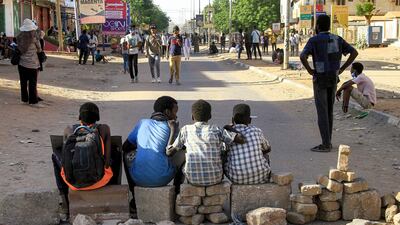Representatives of Sudan’s ruling military and pro-democracy groups said early on Saturday that they are postponing the signing of an agreement to allow a civilian-led government to run the country until elections are held.
A statement by the spokesmen for both sides said the delay was necessitated by the failure of both sides to reach a consensus on “some outstanding issues”. It did not elaborate.
A signing ceremony of the deal had been scheduled for Saturday.
The two sides, along with foreign mediators, will meet later on Saturday to set a new date for the signing of the deal, according to the statement.
Sudan has been mired in political and economic chaos since a 2021 military coup derailed its democratic transition following the ouster in 2019 of dictator Omar Al Bashir amid a wave of street protests against his 29-year regime.

The coup was staged by army chief Gen Abdel Fattah Al Burhan and the commander of a powerful paramilitary, Gen Mohamed Hamdan Dagalo. The coup was met by a wave of street protests in which more than 125 people were killed and more than 6,000 injured.
Gen Al Burhan and Gen Dagalo are now at sharp odds over how to adopt demands by the pro-democracy movement that the military, security agencies and police undergo significant reform.
The much-heralded deal is designed to build on a preliminary agreement reached in December that provided for the military to step down and quit politics altogether and for the paramilitary force — the Rapid Support Forces — to be fully integrated into the armed forces.
Media reports in recent days have suggested that the proposed RSF integration is the main stumbling block in the negotiations, with the paramilitary proposing a process stretched over 10 years compared to the two years suggested by the army.
Gen Al Burhan has said he would not sign off on an agreement that does not include clear and acceptable language on the RSF integration, complete with a timeline.

Gen Dagalo has spoken of his support for a “single army”, but never unequivocally accepted bringing the RSF under full army command, saying it has to be part of reforms at all state institutions and not diminish the “special status” of his force.
In theory, the RSF has been under the command of the military since 2013 when a law legalised its existence, but the well-armed and combat-seasoned force has been run and operated independently.
It bankrolls and procures its own weapons, hires foreign military advisers and runs its own business interests. It is believed to have 100,000 men. It has deployed across the capital Khartoum since 2019.
The RSF has its roots in a militia that fought on the government’s side during the civil war in the western Darfur region. The militia, known as the Janjaweed, was accused of committing atrocities during that conflict.


